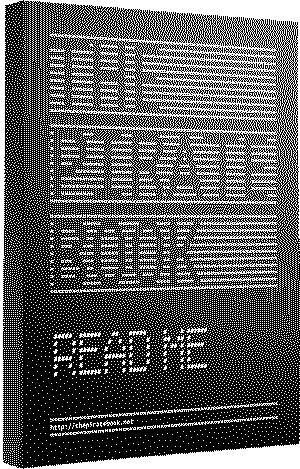Nicolas Maigret, Maria Roszkowska (eds.): The Pirate Book (2015)
Filed under book | Tags: · copy, copyright, filesharing, intellectual property, piracy, warez

“A compilation of stories about sharing, distributing and experiencing cultural contents outside the boundaries of local economies, politics, or laws.
This publication offers a broad view on media piracy as well as a variety of comparative perspectives on recent issues and historical facts regarding piracy. It contains a compilation of texts on grass-roots situations whose stories describe strategies developed to share, distribute and experience cultural content outside of the confines of local economies, politics or laws. These stories recount the experiences of individuals from India, Cuba, Brazil, Mexico, Mali and China. The book is structured in four parts and begins with a collection of stories on piracy dating back to the invention of the printing press and expanding to broader issues (historical & modern anti-piracy technologies, geographically-specific issues, as well as the rules of the Warez scene, its charters, structure and visual culture…).”
Contributions by Jota Izquierdo, Christopher Kirkley, Marie Lechner, Pedro Mizukami, Ernesto Oroza, Clément Renaud, Ishita Tiwary, Ernesto Van der Sar, Michaël Zumstein.
Publisher Aksioma – Institute for Contemporary Art, Ljubljana, 2015
Copyleft
[240] pages
PDF (56 MB)
Comment (0)Hillel Schwartz: The Culture of the Copy: Striking Likenesses, Unreasonable Facsimiles, 2nd ed. (1996/2013)
Filed under book | Tags: · animal, appropriation, art, children, computing, copy, death, fashion, film, gender, genetics, history, imitation, japan, language, machine, memory, music, photography, piracy, property, reenactment, reproduction, sculpture, simulation, slavery, statistics, surgery, technology, theatre, time, war

The Culture of the Copy is an unprecedented attempt to make sense of the Western fascination with replicas, duplicates, and twins. In a work that is breathtaking in its synthetic and critical achievements, Hillel Schwartz charts the repercussions of our entanglement with copies of all kinds, whose presence alternately sustains and overwhelms us. Through intriguing, and at times humorous, historical analysis and case studies in contemporary culture, Schwartz investigates a stunning array of simulacra—counterfeits, decoys, mannequins, and portraits; ditto marks, genetic cloning, war games, and camouflage; instant replays, digital imaging, parrots, and photocopies; wax museums, apes, and art forgeries, not to mention the very notion of the Real McCoy. Working through a range of theories on biological, mechanical, and electronic reproduction, Schwartz questions the modern esteem for authenticity and uniqueness. The Culture of the Copy shows how the ethical dilemmas central to so many fields of endeavor have become inseparable from our pursuit of copies—of the natural world, of our own creations, indeed of our very selves.
This updated edition takes notice of recent shifts in thought with regard to such issues as biological cloning, conjoined twins, copyright, digital reproduction, and multiple personality disorder. At once abbreviated and refined, it will be of interest to anyone concerned with proglems of authenticity, identity, and originality.
First published in 1996
Publisher Zone Books, New York, 2013
ISBN 1935408453, 9781935408451
480 pages
Review (Terence Hawkes, London Review of Books, 1997)
Review (Francis Kane, The New York Times, 1997)
Review (Todd Gitlin, Los Angeles Times, 1997)
Download (removed on 2014-3-20 upon request of the publisher)
Comment (1)Marysia Lewandowska, Laurel Ptak (eds.): Undoing Property? (2013)
Filed under book | Tags: · art, commons, computing, curating, gentrification, immaterial labor, music, piracy, political economy, property, publishing, theory

“Undoing Property? examines complex relationships inside art, culture, political economy, immaterial production, and the public realm today. In its pages artists and theorists address aspects of computing, curating, economy, ecology, gentrification, music, publishing, piracy, and much more.
Property shapes all social relations. Its invisible lines force separations and create power relations felt through the unequal distribution of what is otherwise collectively produced value. Over the last few years the precise question of what should be privately owned and publicly shared in society has animated intense political struggles and social movements around the world. In this shadow the publication’s critical texts, interviews and artistic interventions offer models of practice and interrogate diverse sites, from the body, to the courtroom, to the server, to the museum. The book asks why propertization itself has changed so fundamentally over the last few decades and what might be done to challenge it. The “undoing” of Undoing Property? begins with the recognition that something else is possible.”
With contributions by Agency, David Berry, Nils Bohlin, Sean Dockray, Rasmus Fleischer, Antonia Hirsch, David Horvitz, Mattin, Open Music Archive, Matteo Pasquinelli, Claire Pentecost, Florian Schneider, Matthew Stadler, Marilyn Strathern, Kuba Szreder, Marina Vishmidt; preface by Binna Choi, Maria Lind, Emily Pethick
Publisher Sternberg Press, Berlin, and Tensta konsthall, Stockholm, 2013
ISBN 9783943365689
256 pages
via Matteo Pasquinelli
Publisher (Sternberg)
Publisher (Tensta konsthall)
PDF, PDF, PDF (12 MB, updated on 2018-6-22)
Git repository (containing templates and design, added on 2017-12-20)

